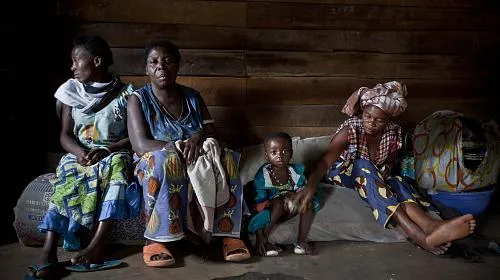CARE calls for total protection of women and girls
GOMA (August 7, 2012) – CARE, one of the largest aid organizations worldwide, calls for total protection of women and girls in eastern Democratic Republic of the Congo as the conflict in North Kivu enters its fourth month. The recent escalation of violence affects over 320,000 people, including over 200,000 who are displaced in the Democratic Republic of the Congo or neighboring Rwanda or Uganda. Women and girls are particularly vulnerable to sexual and gender-based violence in this context.
“Sexual and gender-based violence is getting worse in DR Congo. Families leave their homes in fear as the fighting spreads. Women and girls flee to avoid being subjected to horrendous acts of sexual violence. Some have experienced terrible attacks on their bodies, such as rapes,” says Yawo Douvon CARE Democratic Republic of the Congo’s Country Director.
“The number of instances of gender-based violence has increased every month since the conflict began in April,” Douvon continues. “Sexual violence is endemic in eastern Democratic Republic of the Congo, and here we are seeing a situation that is the worst in years.”
Working at the community and camp levels, CARE has been able to provide support to survivors of sexual and gender-based violence as well as to prevent such atrocities in the Democratic Republic of the Congo. In collaboration with humanitarian partners, CARE is running four projects that treat survivors and work to stop sexual violence in conflict areas in North Kivu. But it’s still not enough.
Exact numbers of survivors of sexual violence are hard to come by. A culture of secrecy often inhibits women from seeking care after they have been raped. In the worst affected areas, fighting makes it difficult for aid organizations like CARE to reach clinics and collect data. Many roads connecting towns and villages are too unsafe to travel on due to the presence of armed groups. CARE calls for improved access to all populations in need, including prevention of and treatment for survivors of sexual violence. In addition CARE highlights the need for:
- Support for improved security for displaced people, e.g. proper lighting for sanitary installations
- An improved reporting mechanism for displaced people living in host communities
- Continued support for the “cluster approach” to humanitarian coordination of protection and gender-based violence organizations and activities to ensure coordinated delivery of services for survivors
- Ensure that local authorities and security forces are held accountable and provide services to survivors of gender-based violence and other vulnerable groups
- Including men in the prevention of sexual and gender-based violence
- An improved system for survivors of sexual violence to be referred to health, legal and psychosocial services
- All parties of the conflict to respect international treaties on protection, especially related to sexual violence as a weapon of war
“I’ve worked for CARE since 2006 and the present situation is quickly approaching the same level of absolutely devastating fighting that took place here in 2008, “says Drocella Munderere, a gender-based violence specialist with CARE in the Democratic Republic of the Congo. “Back then we saw the sort of violence that we’re seeing today in North Kivu” she says.
In neighboring Rwanda, over 19,537 Congolese have fled and 11,000 have been transferred to a camp in Kigeme. CARE is providing waste management, healthcare and gender-based violence counseling and assistance. The number of people fleeing to Uganda is increasing and now stands at more than 30,000. CARE Uganda is closely monitoring the humanitarian situation and preparing an emergency response to assist the refugees.
Media Contacts:
Atlanta: Nicole Harris, CARE, nharris@care.org, 1.404.979.9503, 1.404.735.0871

